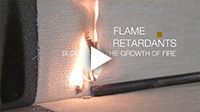

News
EBFRIP Statement on VECAP European Annual Progress Report 2009
Potential emissions from brominated flame retardant production and user plants in Europe were significantly reduced last year, thanks to a voluntary industry programme.
The latest findings from the Voluntary Emissions Control Action Programme (VECAP) Annual Progress Report, released today, show visible reductions in potential emissions to air, land and water. This is mainly thanks to the application of VECAP best practices. In its fifth year of existence, the programme continues to grow significantly both in participation and geographical coverage.
The VECAP programme estimates emission levels based on an understanding of the "worst case" potential emissions from plastics and textiles processes. On this basis, between 2008 and 2009, the overall potential emissions in Europe of Decabromodiphenyl ether (Deca-BDE) were reduced from 3,432kg to 1,220kg. Over the same period, potential emissions of Tetrabromobisphenol A (TBBPA) were reduced from 815kg to 189kg and of Hexabromocyclododecane (HBCD) from 2,017kg to 309kg. A significant part of this improvement results from the application of VECAP best practices in 2009.
From an initial 80 sites in six European countries, VECAP has now grown to cover 135 participating sites. Together these sites handle 85% of the total volume of the above three brominated flame retardants.
Further key findings of the report include:
- Establishment of a year-on-year methodology for comparing potential emissions
- Awareness that the disposal of industrial chemical packaging is the main potential emission source today, which has been followed by a specific programme targeting such emissions
- Launch of a VECAP certification scheme with three sites certified so far
Willem Hofland, Chair of the European Brominated Flame Retardant Industry Panel (EBFRIP) said: "Our latest VECAP progress report shows significant reductions in potential emissions of brominated flame retardants in Europe. We are pleased to see that common long-term efforts within our industry have been fruitful and that the programme is attracting more and more participants throughout Europe."
Background: The Voluntary Emissions Control Action Programme (VECAP) aims to reduce brominated flame retardants emissions through a better understanding and better management throughout the supply chain, from the producers to the downstream users. EBFRIP members initiated VECAP in 2004 to apply and further develop the best available practices in the handling of the chemicals they produce, both at the manufacturing sites and within the value chain. At its creation VECAP focused on Deca-BDE. Over the past five years, VECAP has expanded its coverage to include also HBCD and TBBPA, as these three chemicals are common to the EBFRIP members.
For further information please contact: Phil Hope, Cefic Sector Group Manager, EBFRIP, Tel: +32 2 676 7230, email: pho@cefic.be

-
"The principles underlying VECAP may be applicable to the handling of other chemicals and Cefic is committed to increasing industry's awareness of this programme. At a time when the chemical industry and its supply chain are preparing for REACH, VECAP is an example of how cooperation throughout the value chain can be enhanced for the benefit of the environment."Alain Perroy, Director, European Chemical Industry Council (Cefic)









